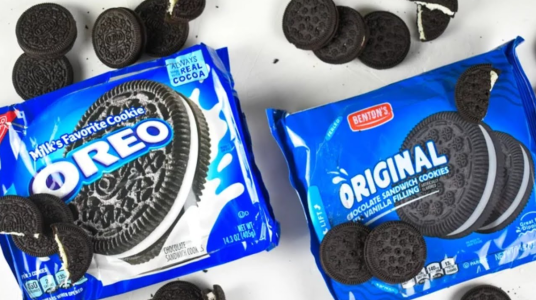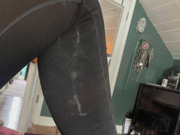ALDI copies cookie packaging, snack giant fights back
By
Gian T
- Replies 28
If you’ve ever wandered the aisles of ALDI and thought, ‘Hang on, doesn’t that biscuit look a lot like an Oreo?’—you’re not alone!
In fact, the resemblance is so striking that it’s landed ALDI in hot water with one of the world’s biggest snack companies.
The major snack company has taken ALDI to court, accusing the supermarket of copying packaging and causing customer confusion
In a hefty 72-page federal complaint filed in the US, Mondelez claims ALDI’s own-brand products are dressed up in packaging that’s just a little too close for comfort to their famous snacks.
The lawsuit points to ALDI’s Original Chocolate Sandwich Cookies (which look suspiciously like Oreos), Thin Wheat Original Crackers (think Wheat Thins), Vanilla Wafers, and Golden Round Crackers (Ritz, anyone?) as prime examples.
Mondelez argues that ALDI’s packaging mimics their colours, fonts, and even the little symbols that make their products stand out on the shelf.
According to Mondelez, this isn’t just a cheeky nod to the originals—it’s a calculated move to 'trade upon the valuable reputation and goodwill' of their brands, potentially tricking shoppers into thinking they’re getting the real deal.
You might be wondering, ‘Does it really matter if the packaging looks similar?’
For big brands, the answer is a resounding yes. Packaging isn’t just about looking pretty—it’s a powerful tool for building brand recognition and trust.
When you see that familiar blue Oreo packet, you know exactly what you’re getting.
If a lookalike pops up with similar colours and fonts, it can muddy the waters, especially for those of us who might not have our reading glasses handy!
Mondelez says ALDI’s approach could 'deceive and confuse consumers and dilute the distinctive quality' of their packaging.
In other words, if shoppers can’t tell the difference, it could hurt Mondelez’s reputation and bottom line.
ALDI, for its part, hasn’t commented publicly on the lawsuit just yet.
However, the supermarket is well-known for its strategy of offering low-priced alternatives to big-name brands—often with packaging that’s, shall we say, ‘inspired’ by the originals.
According to Mondelez, they’ve raised concerns with ALDI before, and while the supermarket has sometimes tweaked or discontinued products, the snack giant claims the copycatting continues.
ALDI’s website proudly proclaims its mission to save customers money on the products they love, and it’s no secret that many shoppers flock to ALDI for its affordable ‘dupes’.
Social media is full of fans comparing ALDI’s versions to the originals, with some even preferring the taste (and the price tag) of the ALDI alternatives!
This isn’t the first time a supermarket has been accused of copying a big brand’s look.
It’s a common practice in the world of private-label products. Supermarkets know that familiar packaging can catch a shopper’s eye and make them more likely to try a cheaper alternative.
For budget-conscious Aussies, these ‘dupes’ can be a real lifesaver—especially with the cost of living on the rise.
But for the big brands, it’s a battle to protect their identity and the years of marketing that have gone into making their products household names.
Lawsuits like this one are their way of drawing a line in the sand.
While this particular lawsuit is playing out in the US, it raises interesting questions for us here in Australia.
ALDI’s shelves are packed with lookalike products, and most of us have probably popped a ‘fake’ Tim Tam or a ‘not-quite’ Shapes into our trolley at some point.
For many, the savings are worth it—but it’s always good to know exactly what you’re buying.
If you’re a die-hard fan of the originals, you might stick with the big brands.
But if you’re happy to try a dupe and save a few dollars, ALDI’s versions can be a tasty alternative.
Just remember: while the packaging might look similar, the recipe inside could be a little different!
 Have you ever been fooled by lookalike packaging at ALDI or another supermarket? Do you prefer the originals, or are you a fan of the budget-friendly alternatives? Share your stories and tips in the comments below.
Have you ever been fooled by lookalike packaging at ALDI or another supermarket? Do you prefer the originals, or are you a fan of the budget-friendly alternatives? Share your stories and tips in the comments below.
In fact, the resemblance is so striking that it’s landed ALDI in hot water with one of the world’s biggest snack companies.
The major snack company has taken ALDI to court, accusing the supermarket of copying packaging and causing customer confusion
In a hefty 72-page federal complaint filed in the US, Mondelez claims ALDI’s own-brand products are dressed up in packaging that’s just a little too close for comfort to their famous snacks.
The lawsuit points to ALDI’s Original Chocolate Sandwich Cookies (which look suspiciously like Oreos), Thin Wheat Original Crackers (think Wheat Thins), Vanilla Wafers, and Golden Round Crackers (Ritz, anyone?) as prime examples.
Mondelez argues that ALDI’s packaging mimics their colours, fonts, and even the little symbols that make their products stand out on the shelf.
According to Mondelez, this isn’t just a cheeky nod to the originals—it’s a calculated move to 'trade upon the valuable reputation and goodwill' of their brands, potentially tricking shoppers into thinking they’re getting the real deal.
You might be wondering, ‘Does it really matter if the packaging looks similar?’
For big brands, the answer is a resounding yes. Packaging isn’t just about looking pretty—it’s a powerful tool for building brand recognition and trust.
When you see that familiar blue Oreo packet, you know exactly what you’re getting.
If a lookalike pops up with similar colours and fonts, it can muddy the waters, especially for those of us who might not have our reading glasses handy!
Mondelez says ALDI’s approach could 'deceive and confuse consumers and dilute the distinctive quality' of their packaging.
In other words, if shoppers can’t tell the difference, it could hurt Mondelez’s reputation and bottom line.
ALDI, for its part, hasn’t commented publicly on the lawsuit just yet.
According to Mondelez, they’ve raised concerns with ALDI before, and while the supermarket has sometimes tweaked or discontinued products, the snack giant claims the copycatting continues.
ALDI’s website proudly proclaims its mission to save customers money on the products they love, and it’s no secret that many shoppers flock to ALDI for its affordable ‘dupes’.
Social media is full of fans comparing ALDI’s versions to the originals, with some even preferring the taste (and the price tag) of the ALDI alternatives!
This isn’t the first time a supermarket has been accused of copying a big brand’s look.
For budget-conscious Aussies, these ‘dupes’ can be a real lifesaver—especially with the cost of living on the rise.
But for the big brands, it’s a battle to protect their identity and the years of marketing that have gone into making their products household names.
Lawsuits like this one are their way of drawing a line in the sand.
While this particular lawsuit is playing out in the US, it raises interesting questions for us here in Australia.
For many, the savings are worth it—but it’s always good to know exactly what you’re buying.
If you’re a die-hard fan of the originals, you might stick with the big brands.
But if you’re happy to try a dupe and save a few dollars, ALDI’s versions can be a tasty alternative.
Just remember: while the packaging might look similar, the recipe inside could be a little different!
Key Takeaways
- Mondelez, the maker of Oreo and other popular snacks, has launched a lawsuit against ALDI, accusing the supermarket of copying the packaging of several of its products.
- In court documents, Mondelez claims ALDI’s similar packaging could confuse shoppers and damage the reputation of its iconic brands.
- The legal action seeks financial compensation and wants ALDI, which is headquartered in Germany, to stop selling the alleged 'copycat' products in the US.
- ALDI has previously changed or withdrawn some items after Mondelez’s requests, but Mondelez alleges that the supermarket continues to sell products in packaging that infringes on its trade dress.








